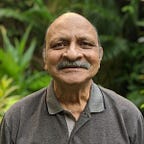Why do we Seek Power?
We perceive real Power as an external artefact to be acquired; when in reality it is a journey which begins from the inside with an internal awareness and acceptance of oneself.
Seeking Power to overcome Insecurity
Our search for power stems from our fear of insecurity and anxiety. We need to protect ourselves from the pain which could arise from the unforeseen circumstances we may encounter. We amass wealth, build the right contacts, develop expertise and so on. All with the intention of gaining power over our unpredictable circumstances. We need to feel we are masters and not victims.
But the more we try to avoid our helplessness through the amassing of power, the more our helplessness and insecurity grows. We become isolated in our large mansions and offices; fearful of everything and everybody. We do not know when and by whom we will be betrayed. Until even a bullet proof car is not enough. We also need a coterie of security detail to protect us. And so the vicious cycle goes on and on. We need to accept the impermanence of life and not fear it.
Seeking Power to overcome Inferiority
This feeling of helplessness sometimes gets magnified by feelings of being insignificant. Having a very poor image of ourselves. We feel inferior. And sometimes this feeling of inferiority drives some to prove that they are more superior than they actually are. They need to feel superior to others. As Alfred Adler, the founder of the school of individual psychology, claims, ‘superiority complexes are born out of inferiority complexes’.
Henry A. Murray, former director of the Harvard Psychological Clinic, in the most famous psychological study of Hitler states that Hitler suffered from “profound feelings of inferiority” which resulted in his “ravenous hunger for power”. The intention is to gain enormous and excessive power so that never again will one feel insignificant.
Arising out of this was his ‘Messiah’ complex. Hitler was convinced that his ideology was what was needed for the world to be a better place. His idea of happiness for his people. The creation of a master race. The rest of humanity were disposable. In fact very often such people delude themselves that they are doing whatever they are doing for the good of mankind. But end up doing a lot of damage to the human race.
They reflect what Dostoyevsky originally stated in ‘The Brothers Karamazov’,
“I love humanity, it’s people I can’t stand.”
Need for Integrity
We live at two levels viz. the covert level and the overt level. At the covert level we experience the rawness and ‘realness’ of life. So covertly we will fight for power through means both fair and foul. But at the overt level we will portray that we need to collaborate with one another. We need to work in harmony. It is politically correct to do so. The ‘real’ living of life takes place at the covert level. Therefore most of our lives are invisible and hidden.
A company CEO will profess overtly that she/he values people and yet covertly will go ahead and dehumanise them by making them feel that they are like slaves owned by the company 24x7. A powerful dictator likes to see people grovel at his/her feet.
It seems that there is an eternal tussle. The overt vs. the covert. However, the sad part, very often, is that the covert part of ‘me’ is not accepted. The shadow self which one tries to hide. The dirty little secrets which one is ashamed of. Looked at in this way one shames one’s real experience of life and lives the sham one. The covert must be accepted and acknowledged. Otherwise all the pretentious overt efforts will soon be seen for what they are. We need to regain our integrity.
Being perceived as ‘Useless’
Running after power also arises from a need to feel useful. But isn’t there a power in being perceived as useless? The world perceives the poor and the destitute as being useless but when one sees their children who hardly have what you could call a roof over their heads playing freely on the street and manifesting an innocent joy of life, we realise that there is a lot of utility in being perceived as useless. The children are free. Power constrains. We learn from the ‘useless’. There is a saying in Tibet
“The joy of a king is not greater than the joy of a beggar.”
When one encounters a poor person, he/she has nothing of material value to offer but himself or herself as a person. For instance just being with a poor old person in an aged home is soothingly reviving. There is no need to speak. Silence communicates volumes. We learn so much. We learn patience and gratitude for what we have. We learn to make peace with ourselves and enjoy the moments left in our lives. We learn having less means appreciating whatever we have much more. Being perceived as ‘useless’ matters.
Power is ultimately an ineffable experience which is not loud and ostentatious but quiet and dignified. It respects and frees rather than controls and dwarfs.
